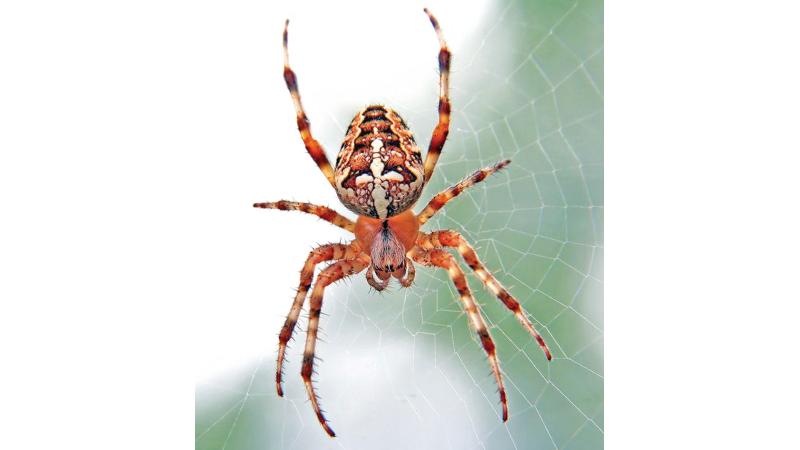
For some unknown reason, people fear spiders. So they destroy them and their webs using chemicals or a brush with a long handle. In villages they use “keppitiya” leaves to remove cobwebs along with their occupants. It is true that cobwebs make your home ugly. However, the spider is one of the most wonderful creatures that have a mission in their lives. They want to rid the environment free from harmful insects. Unfortunately, most people have a negative attitude towards spiders.
Spring
Chinese farmers looking after paddy and cotton fields were perhaps the first to understand the value of spiders. During autumn they build little tepees out of straw. A tepee is a round tent with a pointed top.
The tepees are usually waist-high and scattered across thousands of acres. Although the tepees were a bizarre sight, they had a serious purpose. They were intended to house hibernating spiders. Chinese farmers knew that most spiders die during winter. Therefore, they had to look after them until the winter season is over. When spring approaches, spiders are ready to attack the insects which suck the life out of the young paddy and cotton plants. By protecting the spiders the Chinese farmers increased their crop yields without using insecticides. While the Chinese were the first to harness spider power to protect their crops, agricultural experts in America and several other countries have begun to use spiders to get rid of insects.
There are about 34,000 species of spiders throughout the world. Spiders have eight walking legs, anterior appendages bearing fangs and poison glands. They also have specialized reproductive organs on the second appendages of the male. They make extensive use of silk that they spin. Spiders are generally carnivorous and feed only on living prey.
The bite of some large spiders can be painful, but most species are too small to break our skin and only a few are dangerous to humans. Besides the web spinners, many spiders hunt for their food or lie in wait for it. There are also jumping spiders that lurk in ambush for their prey.
As mentioned earlier, spiders are excellent predators on insects and other small animals. Some spiders feed on plant pollinators such as bees. They also serve as food for other animals.
Spider silk
Apart from pest control, spiders help man in many other ways. Scientists are studying the significance of spider silk for cloth, but it has not been successful economically.
However, spider silk has been used for the cross hairs of optical instruments. Before long spider silk may be used in surgical implants and bulletproof vests.
Some of our houses are invaded by cockroaches. We try to get rid of them by spraying insecticide in every nook and corner, but you cannot eliminate them easily.
Willard H. Whitcomb, emeritus professor of entomology at the University of Florida who is well known as the ‘Florida Spiderman’ says the little brownish-grey creature known as the ‘banana spider’ can eliminate cockroaches and other harmful insects.
Although the Banana Spider is a welcome guest, housewives regularly remove cobwebs making it impossible for the spider to live and serve man.
If scientific research turns out to be successful, spider venom may benefit human health. Already a group of researchers is testing spider chemicals in drugs to combat epilepsy and Alzheimer’s disease. In the meantime, our farmers can employ armies of spiders to protect their crops if they are a little more inventive. Housewives too should not try to eliminate spiders because they do a wonderful service to man by eliminating harmful insects.
Proverbial allusion
In proverbial and traditional allusion, references have been made to the cunning, skill, and industry of the spider, as well as its power of secreting or emitting poison. Scottish national leader Robert the Bruce learnt a lesson of perseverance when he watched how a spider in a cave attempted to spin a thread long enough to reach another piece of rock. “If you want to live and thrive, let the spider run alive” is a proverbial saying. It means that it is traditionally unlucky to harm or kill a spider or destroy a spider’s web.
For those who would reach for the broom whenever they see a tiny spider, Sheila Braine has written a little poem titled Mrs Spider’s Parlour. If you read it meaningfully, you will change your attitude towards spiders born to serve man.
Mrs Spider’s Parlour
Will you walk into my parlour?
Do be friendly, Mr Fly,
It is odd that all my neighbours
Should be so extremely shy
Since I settled in this rose-bush,
Quite protected by the wall
Not a creature, fly or beetle,
Has been kind enough to call.
Thus bemoaning, Mrs Spider
Smiled her most engaging smile
“Please come in; now, what’s to hinder?
Rest your weary wings awhile.”
“Thank you, Ma’am, but pray excuse me;”
- Mr Fly just turned and fled –
“There are rumours that your parlour
Is a dining-room,” he said.
